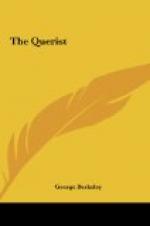35. Qu. Whether current bank notes may not be deemed money? And whether they are not actually the greater part of the money of this kingdom?
36. Qu. Provided the wheels move, whether it is not the same thing, as to the effect of the machine, be this done by the force of wind, or water, or animals?
37. Qu. Whether power to command the industry of others be not real wealth? And whether money be not in truth tickets or tokens for conveying and recording such power, and whether it be of great consequence what materials the tickets are made of?
38. Qu. Whether trade, either foreign or domestic, be in truth any more than this commerce of industry?
39. Qu. Whether to promote, transfer, and secure this commerce, and this property in human labour, or, in other words, this power, be not the sole means of enriching a people, and how far this may be done independently of gold and silver?
40. Qu. Whether it were not wrong to suppose land itself to be wealth? And whether the industry of the people is not first to be consider’d, as that which constitutes wealth, which makes even land and silver to be wealth, neither of which would have, any value but as means and motives to industry?
41. Qu. Whether in the wastes of America a man might not possess twenty miles square of land, and yet want his dinner, or a coat to his back?
42. Qu. Whether a fertile land, and the industry of its inhabitants, would not prove inexhaustible funds of real wealth, be the counters for conveying and recording thereof what you will, paper, gold, or silver?
43. Qu. Whether a single hint be sufficient to overcome a prejudice? And whether even obvious truths will not sometimes bear repeating?
44. Qu. Whether, if human labour be the true source of wealth, it doth not follow that idleness should of all things be discouraged in a wise State?
45. Qu. Whether even gold or silver, if they should lessen the industry of its inhabitants, would not be ruinous to a country? And whether Spain be not an instance of this?
46. Qu. Whether the opinion of men, and their industry consequent thereupon, be not the true wealth of Holland and not the silver supposed to be deposited in the bank at Amsterdam?
47. Qu. Whether there is in truth any such treasure lying dead? And whether it be of great consequence to the public that it should be real rather than notional?
48. Qu. Whether in order to understand the true nature of wealth and commerce, it would not be right to consider a ship’s crew cast upon a desert island, and by degrees forming themselves to business and civil life, while industry begot credit, and credit moved to industry?
49. Qu. Whether such men would not all set themselves to work? Whether they would not subsist by the mutual participation of each other’s industry? Whether, when one man had in his way procured more than he could consume, he would not exchange his superfluities to supply his wants? Whether this must not produce credit? Whether, to facilitate these conveyances, to record and circulate this credit, they would not soon agree on certain tallies, tokens, tickets, or counters?




